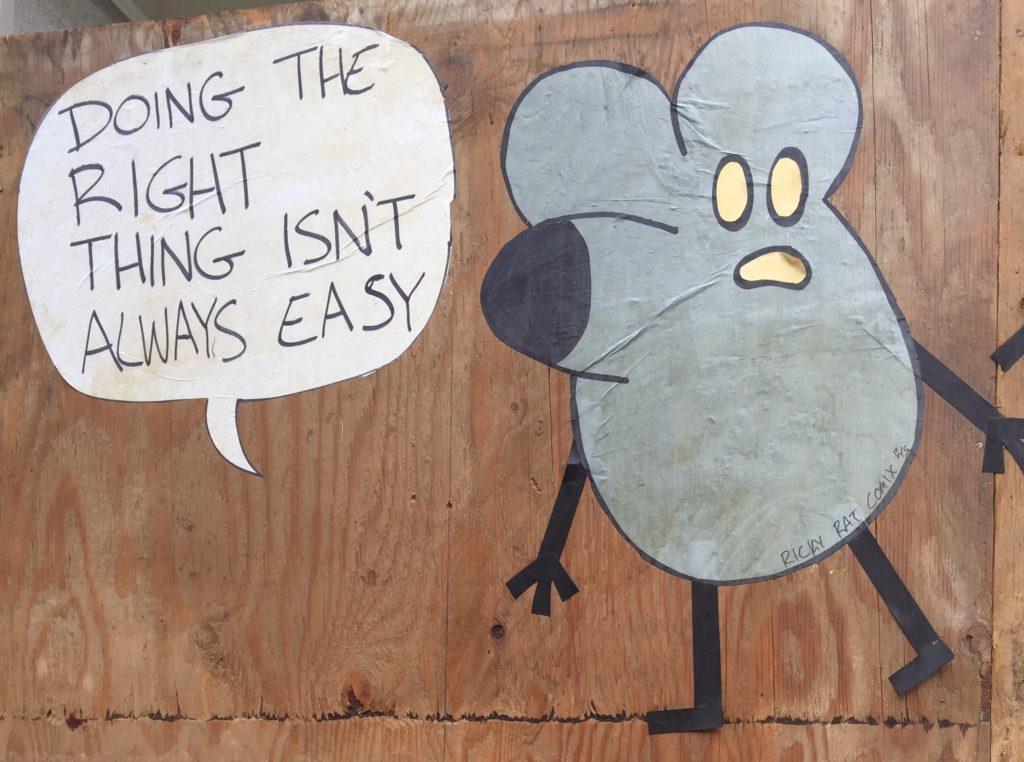 Everyone’s been saying this, just about daily, for some time.
Everyone’s been saying this, just about daily, for some time.
“These aren’t ordinary times.”
If the anthem for the Boomer generation was Bob Dylan’s “The TImes They Are A’Changin’,” what’s the anthem for today? History doesn’t repeat itself, but it rhymes. We’re living in the face of a firehose of breaking news, and much of it is difficult to digest. Let alone know how to face, handle and get through it with safety and sanity intact.
We can retreat, live in limbo or figure out a way to navigate through this reality and find opportunities to do our work in new and better ways.
It’s a difficult assignment, because it’s not easy to know where to begin.
As social benefit organizations, we want to come from a human-centered, community-centered place, but… what exactly might that be in this extraordinary time?
What the World Most Needs Right Now.
I think it’s humanity and trust.
Usually we have to guess at what will feel relevant to our supporters. Today, we pretty much know. Because we hear it all the time. On the news. On social media. When we zoom with colleagues. When we talk to our friends.
- People want to know who they can trust.
- People want their fellow humans to act the part.
- People want to consciously engage — with humans they can trust — in a meaningful manner.
Social benefit organizations have a secret advantage.
Survival in the civil sector is based on the philanthropic exchange, and ‘philanthropy’ means ‘love of humanity’. Yet sometimes it seems all we see and hear is hatred of humanity. Us/Them. Left/Right. Red/Blue. Young/Old. Good/Evil. Insiders/Outsiders. I could go on…
There’s a better way. When you infuse your nonprofit work with humanity, you’ll reach trust.
Trust is the foundation of all lasting relationships.
Your job, as a philanthropy facilitator, is to provide a positive human experience. Your ‘customers’ will be varied, including not just donors and clients but also your own staff. Positive experience is at the heart of successful fundraising (and, for that matter, all sales). For-profit businesses think about this a lot. Nonprofit businesses? Not near enough. Let’s take some time to consider the philanthropic customer experience, not simply on a tactical level but on a vision level.
So-called ‘Nonprofits’ are Actually ‘Social Benefit’ Organizations.
When you lose sight of why you exist, you will have difficulty creating a joyful, meaningful customer experience.
Your vision, mission and values are oriented towards making things better.
One person, one family, one community, one principle at a time. How do you enact this social benefit?
Through constructing a culture built on humanity and trust. Donors care about your essence. Your humanity. Your honesty. Your commitment to taking care of your community. It’s this with which they’ll identify.
It’s a mistake to get lost in your processes. How you enact your programs and services, in support of your mission, is not what people will be moved by. Only you care about that (understandably, because you’re wrapped up in the details).
When you’re able to showcase positive, beneficial traits, people will flock to you.
When you lose sight of them, no one will take notice of you.
4 Strategies to Emerge from Today’s Pain to Tomorrows Joy
1. Emphasize Purpose over Fear
Fear will drag you down at a time you need to lift yourself and your community up.
Here’s an analogy based on what it takes to lift an airplane into the sky:
“The four basic forces that work on an aircraft include lift, weight, thrust, and drag. Well, what are the equivalent forces in a human organization? There’s the lift of human energy, the weight of bureaucracy, the thrust of purpose, and the drag of fear. And if we’re going to get our corporate organization off the ground every day like this airplane, we better have more lift than drag, more human energy than bureaucracy, more purpose focus than fear. And so what are some specific things we can do in all of those areas? Well, I will tell you the ability to go to work and get meaningful things actually done is important.”
— Rich Sheridan: CEO & Chief Storyteller of Menlo Innovations, and author of Joy, Inc.: How We Built a Workplace People Love
More than ever, your supporters care about getting meaningful things done.
It’s your most important job to give them the meaning and purpose they seek.
2. Focus on Caring and Closeness over Solitude and Survival
When you’re scared for your survival it’s human nature to crawl into a bunker and hoard.
“Trust is acting in the interest of others. In a way that enables them to move forward such that they can act in the interest of others. Let us do that in business right now. The more we focus on that, with our team members and customers, the more success we’re going to have in the end. And it’s hard to do right now, because there are people freaking out about what they’re going to do tomorrow. So it’s hard to think about anything else other than, ‘how am I going to survive?’”
Joseph Michelli, Ph.D., psychologist, speaker, and author of The Airbnb Way
Hunkering down may serve you, for a time, but it’s not good for others. Ultimately, it’s not good for you either. People crave, and need, closeness. If you go silent on folks, thinking you’re doing them the favor of ‘not bothering them,’ you’re actually doing your supporters a disservice. In fact, you might even say you’re acting inhumanely.
It’s also human to form communities.
In fact, it’s a survival mechanism. Darwin posited the theory of “survival of the most empathic.” While we associate him with “survival of the fittest,” that’s actually a term created by Herbert Spencer. Darwin took it further, understanding the most “fit” communities were those who banded together to care for their members.
How are you caring for your members right now?
Rather than simply reaching out to ask for money, are you reaching out to ask folks what you can do to help them?
3. Begin Your Culture of Philanthropy at Home.
Take care of yourself and your employees so you all can take care of your customers.
‘Love of humanity’ = ‘culture of philanthropy.”
“And we found companies like Whole Foods… which is spending 90% below the industry average, and yet their customers love them; that kind of fanatically loyal customers that they had. So we started to look at what causes that to happen. And we soon discovered it wasn’t just about the customers, employees have to love these companies, too. That’s exactly why we can’t have customer bliss without employee bliss, in the long run, especially in a service business.
We found that these companies also looked after their employees’ well-being. They cared about their customers’ well-being; they weren’t just trying to sell them stuff. They’re actually trying to lead them to a better place. So Whole Foods moves towards better health for themselves and for the planet. We found that they had stable partnerships with their suppliers, that they were deeply embedded in their communities. So they were really stakeholder-oriented, right? Not just customer focus or investor shareholder-oriented, right? They were focused on the well-being of all of their stakeholders because they’re all connected.”
— Raj Sisodia, Founding member, Conscious Capitalism movement, The Healing Organization: Awakening the Conscience of Business to Help Save the World
Think of yourself as a role model.
Especially now, people seek those who can lead them to a better, more optimistic, more purposeful place. You must model this behavior internally before you can authentically display this behavior externally. Don’t just ‘act the part,’ be the part.
4. Look for Your Quiet Champions.
Pay attention to your staff, board, volunteers and donors who step forward voluntarily to help.
Don’t put them off or shine them on. These are the folks who can lead you forward, if you will only let them. Maybe you didn’t notice them before. Maybe you should have. Now you can.
“We can never be too comfortable with the systems we have in place and the ways in which we care for people. You can always move to a higher level. I truly, truly cherish my team. And people are the forefront of our organization because when you have people who want to do a good job, they seek out leaders who provide the positive feedback, constructive feedback, giving them credit for their ideas. Inviting them to be a part of the decision making power of the organization… I learned that we have silent heroes in our organization. We have quiet champions and they came out and made themselves present and we’ve got to seek them out more often.”
— Linda Ward, President and CEO of Gulfside Healthcare Services
Embrace your heroes and trust their motivation to help.
Whether due to natural disasters, post-election anxiety, pandemic fears, or other causes, many have experienced a lot of loss. Some have lost loved ones. Others have lost businesses and/or income. Some have lost a way of life they’d come to depend on. Others have lost trust in institutions. Some have lost faith, period. I’m reminded of a time I experienced a deep personal loss of a family member. Those who stood by me were not the folks I expected to stand by me. They were quiet champions, for whom I’m forever grateful. When you’re in crisis, ask for help. It helps you; it helps them.”
Why Humanity and Trust can Supercharge Fundraising.
Fundraising always does well for organizations who demonstrate their relevance and invite their constituents to keep the shared vision and mission alive. When you can get inside your donor’s heads you can speak to them authentically – with great humanity.
Reach out proactively. Connect with empathy. Share what you and your constituents have in common. This will lead them to identify with you, trust you, and want to continue their relationship with you. I encourage you to fully harness humanity and truth in all you do.
More Fundraising Communications Resources You May Find Helpful
This is a simple, incredibly thorough, 62-page step-by-step guide to crafting a killer appeal letter or email appeal. In this easy-to-follow guide you’ll learn the art of taking your appeal from run of the mill to… out of the ballpark. From anesthetizing to… astounding. From colorless to… captivating.
This is a simple, step-by-step guide to crafting a killer donor thank you letter. Writing a meaningful nonprofit thank you can be tricky. But it’s not rocket science – it’s something you can easily learn. It’s just not something most of us are taught.
As with all Clairification products, these come with a no-questions-asked, 30-day, 100% refund guarantee.
Image: Found art on San Francisco storefront during coronavirus pandemic.
 Anatomy of a Fundraising Appeal Letter + sample template
Anatomy of a Fundraising Appeal Letter + sample template



